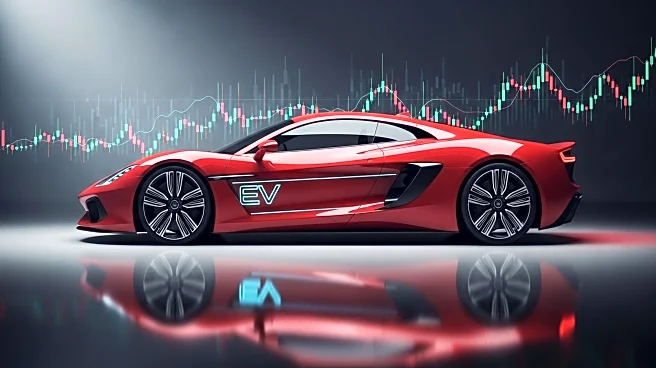What's Happening?
Ferrari has announced a revised growth strategy, projecting revenue of at least €7.1 billion ($10.7 billion) by 2025 and approximately €9 billion by 2030. The company also adjusted its electric vehicle (EV) targets, reducing the expected EV share in its lineup to 20% by 2030, down from a previous target of 40%. This decision was influenced by customer demand and prevailing market conditions. As a result, Ferrari's shares fell significantly, with a 16.1% drop in Milan trading and nearly 15% premarket in the U.S. Analysts from Citi have expressed concerns over the guidance, noting it falls short of expectations and indicates limited leverage in the near term. Despite these challenges, Ferrari plans to launch its first EV, the elettrica, in 2026, and analysts from JPMorgan suggest that strong demand and an upcoming supercar release could bolster profits.
Why It's Important?
Ferrari's revised guidance and EV strategy have significant implications for the automotive industry and investors. The reduction in EV targets reflects broader challenges in transitioning to electric vehicles, including consumer preferences and market readiness. This shift may affect Ferrari's competitive positioning in the luxury car market, where rivals are aggressively pursuing electrification. The financial guidance also impacts investor confidence, as lower-than-expected targets could influence stock valuations and investment decisions. The company's strategic choices will be closely watched by stakeholders, including investors, industry analysts, and competitors, as they navigate the evolving landscape of automotive innovation and sustainability.
What's Next?
Ferrari's future actions will likely focus on balancing its traditional combustion and hybrid models with its new EV offerings. The launch of the elettrica in 2026 will be a critical milestone, potentially affecting market perceptions and sales performance. Stakeholders will be monitoring Ferrari's ability to adapt to changing consumer demands and technological advancements. Additionally, the company's financial performance and strategic decisions will be scrutinized by investors and analysts, particularly in light of the upcoming supercar release, which could influence profitability and market share.
Beyond the Headlines
Ferrari's decision to lower its EV targets highlights the complex dynamics of the automotive industry's shift towards sustainability. Ethical considerations regarding environmental impact and consumer responsibility are increasingly influencing corporate strategies. The company's approach may also reflect broader cultural attitudes towards luxury and performance, balancing tradition with innovation. Long-term shifts in consumer behavior and regulatory pressures could further shape Ferrari's strategic direction, impacting its legacy and future growth.








